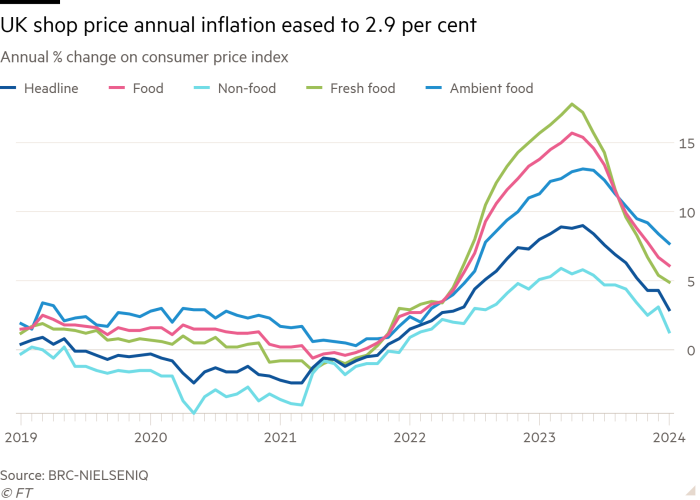Stay informed with free updates
Simply sign up to the UK inflation myFT Digest — delivered directly to your inbox.
UK shop price inflation eased sharply in January to its lowest rate in almost two years as retailers heavily discounted goods during a weak sales period, industry data showed.
The British Retail Consortium said on Tuesday annual shop price inflation slowed to 2.9 per cent in January, down from 4.3 per cent in December. It is the seventh consecutive monthly decline and the lowest rate since May 2022.
Separate data also released on Tuesday by the research company Kantar showed grocery inflation declined more slowly to 6.8 per cent in January, from 6.9 per cent in the previous month.
The BRC index includes all retailers, while Kantar tracks supermarkets. The BRC said non-food prices were the primary drivers of the decline in January, and recorded a figure for food inflation of 6.1 per cent in January, down from 6.7 per cent in the previous month.
Both indices provide early indications of pricing pressures ahead of the publication of official data on February 14, and raise some hopes that underlying inflationary pressures are continuing to ease despite the uptick in the headline measure to 4 per cent in December.
The drop in shop inflation resulted from retailers offering “heavily discounted goods in their January sales to entice consumer spend amidst weak demand”, said BRC chief executive Helen Dickinson.
Despite increasing from 3.9 per cent in November, December’s inflation rate was still well below the multi-decade high of 11.1 per cent reached in October 2022.
Markets have been pricing in that the Bank of England will hold the benchmark interest rate at its 15-year high of 5.25 per cent on Thursday, but will start cutting rates in June as inflation is expected to slow towards the central bank’s 2 per cent target.

Dickinson noted that the price of milk and tea also fell in January compared with the previous month, while increased alcohol duties kept the cost of drinks elevated.
Non-food prices fell 1.4 per cent month on month, driving an overall annual decline across all categories, the BRC said. Annual non-food inflation slowed to 1.3 per cent in January, from 3.1 per cent the previous month, marking the lowest rate since February 2022.
Mike Watkins, head of retailer and business insight at NielsenIQ, who helped to compile the data, said: “Shoppers are seeing savings at the checkout with non-food retailers on promotion and food retailers continuing to reduce prices when the costs of goods fall.”
The BRC reported that both fresh and ambient food prices registered a decline in the annual rate of growth. The former eased from 5.4 per cent to 4.9 per cent, while the latter — which refers to items that can be stored at room temperature — fell from 8.4 per cent to 7.7 per cent.
Fraser McKevitt, head of retail and consumer insight at Kantar, attributed the smaller decline in the annual supermarket inflation to retailers having “taken their foot off the promotions gas slightly”.
Both data suggest official food price inflation will continue to slow after dropping to 8 per cent in December, down from a 45-year high of 19.1 per cent in March. Food and energy prices surged over the past two years after Russia’s full-scale invasion of Ukraine in February 2022, hitting the poorest households the hardest.
Despite the sharp fallback in price growth, the BRC warned about risks to the outlook, such as new cost pressures from higher business rates and the increase in the national living wage from April and from unrest in the Red Sea.
“Rising geopolitical tensions will also add to uncertainty and costs in supply chains,” said Dickinson.
Bonus season — are you headed for a payout or a doughnut?
For the third year in a row, the Financial Times is asking readers to confidentially share their 2024 bonus expectations, and whether you intend to invest, save or spend the cash. Tell us via a short survey











